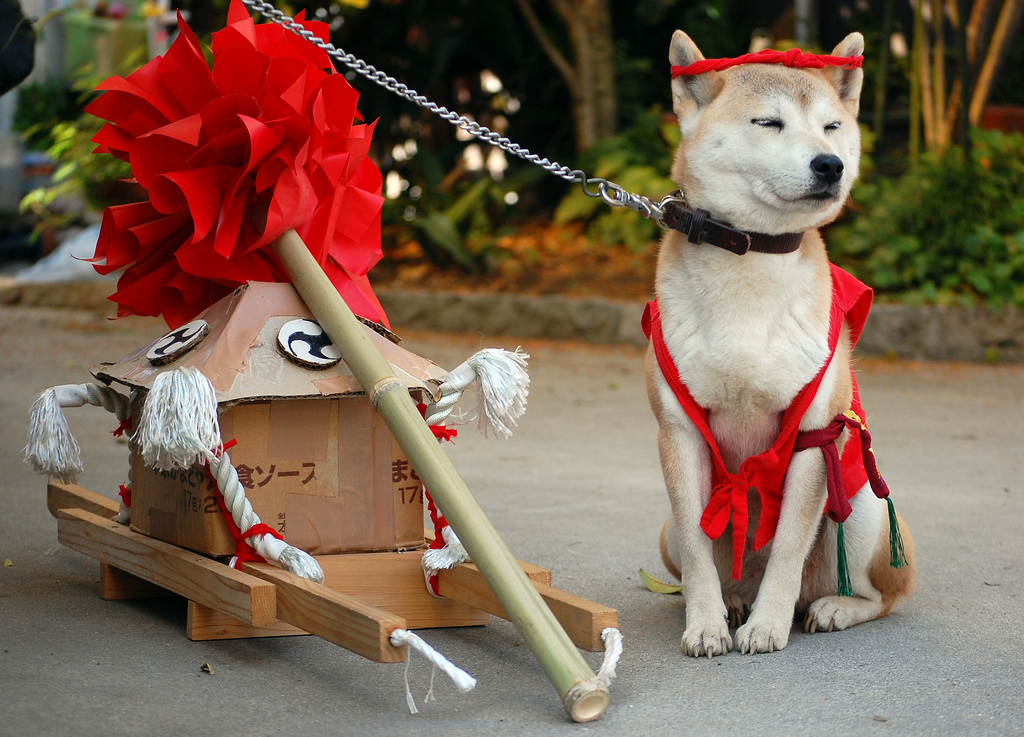
Bringing a pet to Japan involves fulfilling many requirements, but the companionship may be worth it. Photo © showbizsuperstar, licensed Creative Commons Attribution No-Derivatives.
When deciding to move to Japan, you may want to bring your favorite cat, dog, or other pet with you. It can be done, but there are many requirements involved. First of all, upon arrival (with the proper documents), your pet will be quarantined for two weeks or longer at the airport. (It is possible to arrange a home quarantine for pets who are older or require medication.) During this period, you are responsible for feeding and caring for your pet, which will be housed in a kennel. If you’re landing at Narita Airport, note that Narita is located in the neighboring Chiba prefecture, not in Metropolitan Tokyo. Depending on where you are staying, it could take two or three hours to get to the airport from Tokyo. Also keep in mind that most apartments in Japan do not allow pets. A few do, but you will have to hunt for them, and an additional deposit may be required.In my case, I decided not to bring my dog to Japan and left her with several trustworthy friends at home. I didn’t want to subject her to the trauma of air travel, quarantine, and adjustment to an unfamiliar place. Moreover, there was no grass or dirt near my apartment, only concrete and asphalt—not much space to run around, and not much fun. However, if you do decide to bring your pet—and you may have compelling reasons—here’s how. The agency that regulates the transport of animals into Japan is the Animal Quarantine Service of the Ministry of Agriculture, Forestry, and Fisheries. Their policy is as follows:
If you bring a pet dog with you from abroad, it will be detained for a quarantine inspection for a fixed period of time after arrival in Japan in order to examine it for the presence of rabies and leptospirosis. Detention inspections are normally conducted at Animal Quarantine Stations and require that animals be isolated from people and other animals in order to check for the presence of illness or disease. Detention will continue for a period of 14 to 180 days, depending on the existence and the content of rabies vaccination and health certificates issued by the relevant authorities in the country of departure. However, if you bring a dog with you from one of the designated rabies-free areas (only Hawaii in the United States), the detention period may be as short as 12 hours.
In addition, if your dog has not had a rabies vaccination, she will be kept in detention for a period of 30 days—if you have a certificate issued by a government agency in your country of departure containing a statement to the effect that the animal was raised in isolation and that certain conditions have been satisfied. Please be aware that you will not be able to bring your dog into Japan if you do not have a health certificate issued by a government agency. There are 17 ports and airports in Japan through which you may bring your dog (visit www.maff.go.jp/aqs/english for contact information).
There is no cost for the rabies and leptospirosis examination while your dog is held in detention. However, the dog’s owner is responsible for the care of his or her dog during that time.
There is a requirement that you register a dog (91 days old or older) at the local municipal office and receive a dog license. In addition, the dog must have a rabies vaccination once a year at some point between April and June, and must receive a Completion of Rabies Vaccination Tag. The license and tag must be attached to the dog’s collar at all times.
Dogs must be leashed or caged when outdoors, except in designated dog parks (in Japanese). Some restaurants and hotels accept pets. For further information, contact your local municipal office.
See the Ministry of Agriculture website for requirements for cats and other pets. For additional information, contact your local ward or municipal office, local public health center, or the Veterinary Sanitation Section, Living Environment Division, Bureau of Public Health, Tokyo Metropolitan Government (tel. 03/5320-4412).
Excerpted from the Third Edition of Moon Living Abroad in Japan.